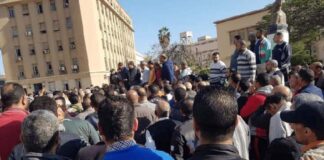The Egyptian revolution has reached a new turning point. People in their hundreds of thousands have returned to Tahrir square and the streets across the country, in response to a brutal crackdown by the military.
The military has exposed its real face to millions with the brutal ferocity of its crackdown on the revolutionaries.
This new stage holds the chance to deepen the revolution. It can begin the push towards a second, socialist revolution to put power in the hands of ordinary working people, seize the wealth of Egypt’s millionaires and finally tackle poverty and social inequality.
The same chants that echoed through Tahrir square in February about Mubarak are now being raised against SCAF, the ruling military junta. “People always suspected that the military would not give up power even after elections. Now there is unprecedented clarity among the people. They understand that the enemy is the military junta,” according to Egyptian socialist Sameh Naguib. “Egyptians don’t just want Field Marshal Tantawi to step down. People now want to see him tried for crimes against the Egyptian people.”
 Already the protests have won new concessions, with the resignation of government ministers and the announcement presidential elections will be brought forward to July 2012.
Already the protests have won new concessions, with the resignation of government ministers and the announcement presidential elections will be brought forward to July 2012.
The growth in people’s understanding since February, when many of those on the streets hailed the army for pushing Mubarak aside, is striking. Then many chanted “the people and the army are one hand”. Now the military rulers’ real role is hitting home.
Anger has been building up for months. Although the head of the regime, Mubarak, was toppled, the rest of the regime remained largely intact. Field Marshal Hussein Tantawi, the head of the military junta, was Mubarak’s right-hand man, and the army was a key part of his regime. The military rulers have tried to maintain as much of the Mubarak-era setup as possible. They have failed to grant any serious social reforms to address the fact that 40 per cent of Egyptians live on less than $2 a day.
The regime is resisting efforts by groups of workers to reverse Mubarak’s privatisation program, that saw state assets sold off to the regime’s cronies. It has not been prepared to impose the livable minimum wage that many of the protests are demanding. At the same time it has been rebuilding Mubarak’s apparatus of repression, letting the Central Security Forces loose on strikers and protests. It has hauled 12,000 people to face charges before military tribunals since February.
But the ruthlessness of the latest crackdown is new. At least 35 have been killed so far. “The attacks we face are more brutal than anything we’ve seen yet… All around people are dying. The army are throwing dead bodies on the street. It has a fascist tone to it. Over 2,000 have been injured and many of those injuries are very serious,” according to Sameh. Now the toll of injured is over 3000.
This shows the violence with which the military and Mubarak’s cronies will defend their power. At the moment a more vicious military crackdown with the massacre of protesters could inflame the movement further. But the military rulers will be looking for a way to crush the movement again when their chance comes.
Working class power
In February it was the entry of the working class into the revolution as an organised force that dealt the final blow to Mubarak. Workers have the power to shut down the country in a way that even enormous demonstrations do not.
Since Mubarak’s toppling, there has been an enormous strike wave across the country. Hundreds of corrupt bosses have been forced to quit, and many workers have won pay rises. Some have even elected their own company managers and pushed to impose democratic control on their workplaces.
Bringing the workers’ movement together in a new general strike to take on the military regime holds the power to bring down the rest of Mubarak’s regime. The prospect of workers shutting down industry threatens the profits and wealth of the key figures in the regime—both in the military leadership and in big business. This is the key to moving the revolutionary process from a political revolution to dismantle the Mubarak-era structures, to a social revolution to redistribute the country’s wealth.
This will require the building of popular democratic institutions to replace the regime. The creation of workers councils—called soviets in the Russia revolution in 1917 and shoras in the Iranian revolution in 1979—are the key to this.
A revolution is a process, and there are many steps still to come in Egypt. Elections will be held next week, to elect a parliament that will draft a new constitution. These may be used to give legitimacy to a new civilian government prepared to collaborate with the military regime.
But ordinary Egyptians now have taste of their power through mass protests and strikes to change society. Their heroic struggle has inspired people to fightback against austerity and unemployment across the world, from Greece and Spain to the Occupy movement in the US and in Australia.
We need to show our solidarity with their struggle, and pressure the Australian government to speak out against SCAF and its bloody repression. They were quick to condemn Libyan President Gaddafi for “killing his own people” but are silent when the Egyptian generals are doing the killing. Egypt’s revolution is part of the fight of the 99 per cent against corporate greed the world over.
The future of the Arab Spring and freedom for the Palestinians is being settled in the streets and factories of Cairo and Alexandria.




